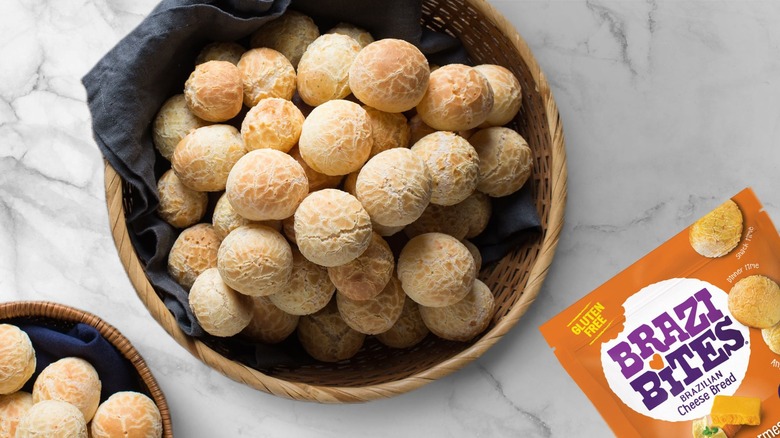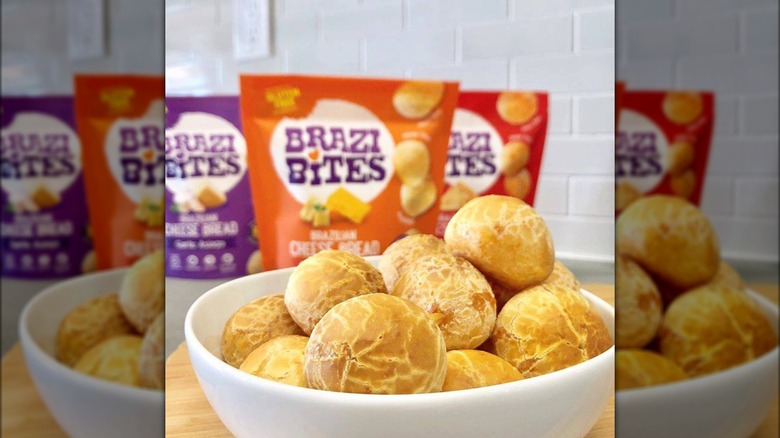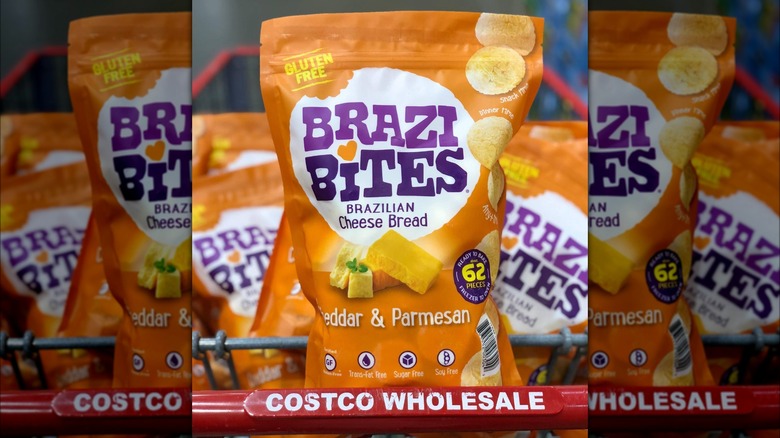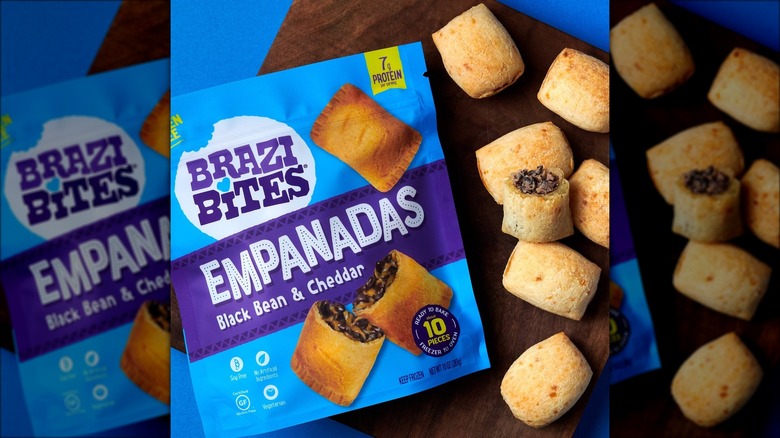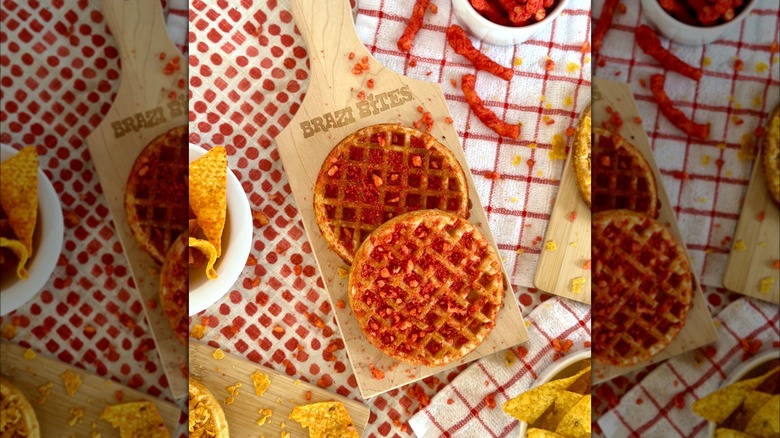Brazi Bites: Here's What Happened After Shark Tank
We may receive a commission on purchases made from links.
Family gatherings in Brazil seldom take place without an array of food to fuel the conversations. There are coxinhas and churrasco, moqueca and empanadas, and almost always, a basket of warm pão de queijo on the table. Also known as Brazilian cheese bread, these small balls of golden dough are crisp on the outside, fluffy with molten cheese on the inside, and delicious enough to be eaten by the dozen. And it is these Brazilian cheese breads that caused a frenzy in season 7 of "Shark Tank."
When Brazil-born Junea Rocha moved to the U.S., pão de queijo was a snack that she sorely missed from home. Armed with a family recipe from her mother and the help of her husband Cameron MacMullin, Rocha began to experiment on a fridge full of cheese to find a replacement for the minas that is traditionally used for the gooey cheese filling in pão de queijo. When she finally found a recipe that her mother would have been proud of, the husband-wife duo launched Brazi Bites to bring the Brazilian cheese bread to American homes.
Brazi Bites' journey began at a food show, but once Rocha and MacMullin found that there was an appetite for their gluten-free Brazilian cheese bread, the entrepreneurs decided it was time to test new waters. So five years later, Rocha and MacMullin brought Brazi Bites to "Shark Tank," hoping to win a Shark or two over with their fluffy cheese bread.
What happened to Brazi Bites on Shark Tank?
Rocha and MacMullin walked into "Shark Tank" hoping to secure a $200,000 investment in exchange for a 10% stake in Brazi Bites, and boy were the Sharks a fan! Their bacon, jalapeño pepper jack, and garlic asiago cheese flavors were a hit — but that wasn't the best part. Made from tapioca flour, the bread was naturally gluten-free — a fact that caught Bantam Bagels investor Lori Greiner's attention — contained no preservatives, and a three-piece serving packed no more than 120 calories.
Brazi Bites had more going for it than just the taste of its cheese bread though. Brazi was already in 700 stores across the country, including Whole Foods and Sprouts. Its revenue had also tripled every year since its inception, and the entrepreneurs were on track to make a million at the time of their appearance on the show — all things that the Sharks like to hear.
But there were some concerns: The entrepreneurs had already sold half of the company's equity to their co-packers, leaving them with only a 50% stake in Brazi Bites. This concerned Robert Herjavec and Mark Cuban who both backed out of the deal. Daymond John made an offer to put up the $200,000 in exchange for 25% equity as did Greiner — whereas Mr. Wonderful offered to make the investment at 20% instead. After haggling, the entrepreneurs found their new investor in Greiner and parted with 16.5% of equity for her $200,000 investment.
Brazi Bites after Shark Tank
Although Rocha and MacMullin shook hands with Greiner before walking out of the Tank, the deal never materialized after the show aired. Rocha told Startup to Storefront that Greiner wanted to hold off on the deal for 18 months without agreeing to revise the valuation based on what Brazi's revenue would be at the time. But the entrepreneurs expected a lot of traction in the months to come, especially with an upcoming deal with Costco, which meant that Brazi's value would skyrocket. Rocha and MacMullin wanted an investor to jump in with them from the start or take into account Brazi's increased valuation, which is where Greiner and Brazi Bites mutually parted ways.
As it turns out, the entrepreneurs may have been right in predicting Brazi's popularity post-show. Rocha told CNBC that the "Shark Tank Effect" is very real, adding that Brazi sold out at grocery stores all across the country within three days of their episode's airing. "Viewers watched the show, went to the locator on our website, drove to stores, and bought Brazi Bites in the freezer section. And they bought all of it," she later told the website. Over the next six months, viewers were wiping out supermarket shelves as soon as they were stocked with Brazi Bites, buying the frozen cheese bread in bulk. The result? Brazi Bites went from a million-dollar business to one that had $10 million in revenue the year that their "Shark Tank" episode aired (per YouTube).
Is Brazi Bites still in business?
Fans of pão de queijo and gluten-free bread lovers will be happy to know that Brazi Bites is still in business and thriving by the looks of it. Since Brazi Bites multiplied its revenue by 10 by the time "Shark Tank" aired in 2016, the company went through a major rehaul to redesign its packaging and make it more fun, vibrant, and colorful. The entrepreneurs quickly closed deals with various supermarket giants, taking their frozen Brazilian cheese breads to even more Whole Foods stores across the country, as well in stores like Harris Teeter, Sam's Club, Costco, and HEB. As of 2018, Brazi was in more than 6,000 stores nationwide.
Brazi became the third-fastest-growing private company in Oregon and the fastest-growing woman-led food company in the whole country. Brazi had shown a 4,554% growth rate in three years and was placed in the 81st position on the Inc. 5000 annual list of the fastest-growing private companies in America in 2017. But then came a change: To fuel its accelerating growth, Rocha and MacMullin decided to sell a majority stake in Brazi Bites to San Francisco Equity Partners in 2018. The entrepreneurs wanted Brazi to expand into more categories and become a brand that sold all kinds of better-for-you foods from Latin America, so expand they did. Brazi Bites has not only introduced more flavors of Brazilian cheese bread, but they also sell gluten-free sweet and savory waffles, pizza bites, and empanadas now.
What's next for Brazi Bites?
Brazi Bites has come a very long way since its appearance on "Shark Tank." Its savory waffles have made their way onto The Kitchn's list of 10 best new groceries at supermarkets in 2023, its pizza bites are a back-to-school essential according to Jamie O' + Co., and its Brazilian cheese breads were on Forbes' 50 best healthy snacks in 2021. Plus, Brazi was on its way to reaching the $30 million mark in 2021, so it's safe to say that the company's future — with both its old and new products a hit among the masses — only looks brighter.
That said, Rocha's role has changed since the sale with San Francisco Equity Partners. While MacCullin is still the Chief Operating Officer according to Linkedln, Rocha has stepped down as the CEO to become Brazi's Chief Marketing Officer. The co-founder's focus is not just on Brazi; in 2012, Rocha announced the launch of her Latino Entrepreneur Accelerator Program. The program would give a no-strings-attached $10,000 grant to Latino entrepreneurs as well as 12 weeks of mentorship from Rocha and the Brazi team, with a chance for the three finalists to score marketing exposure through Brazi's platforms. Rocha rolled out the accelerator program again in 2023 – and if the previous year's success is any indication, her new venture may very well continue in the years to come.

